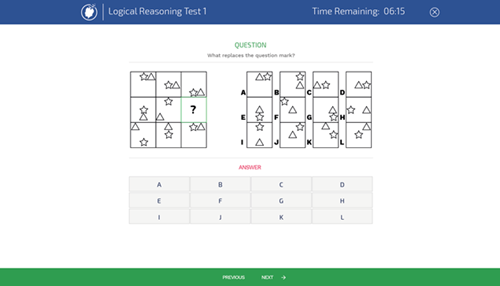Now that we have arrived at the point right before we lay out all the components of the cognitive ability questions on a silver platter, the implicit question must be answered: what are cognitive ability questions?
Numerical Reasoning
The Numerical Reasoning component of the Cognitive Ability Preparation Package includes the following tests:
- Numerical Reasoning: 12 tests amounting to 240 questions.
- Number sequences: 18 tests 450 questions
- Math Word Problems: 7 tests with 140 questions.
Numerical Reasoning tests are often founded on tabulated data and charts representing different business-related practical scenarios. Each scenario is followed by questions that connect to the provided data. Numerical Reasoning tests help gauge the candidate's ability to analytically infer, and deduce logical interpretations based on the presented array of data.
Although proficiency in mental arithmetic is a bonus when it comes to finishing before the time limit is reached, the intention of numerical reasoning tests is not geared towards measuring one's ability to be good at advanced mathematics. Numerical aptitude tests are an integral part of assessments and a basic understanding of arithmetic, number sequences, percentages, financial arithmetic, and data interpretation, are measured. More important is that you are capable of making sound use of data to formulate logical decisions.
The most common Numerical Reasoning questions in psychometric tests are Graphs and charts that show an array of data with regard to certain variables and statistics. This test also frequently presents itself in the form of tabular data. It is often the case that the data is seemingly unrelated but it is your task to infer and deduce the correct inter-relationships and patterns to come up with the correct answer.
Take one of our FREE Numerical Reasoning test with 10 questions on graphs, charts, and tables and see how you rank against other candidates! Click on the provided link above or the image below.
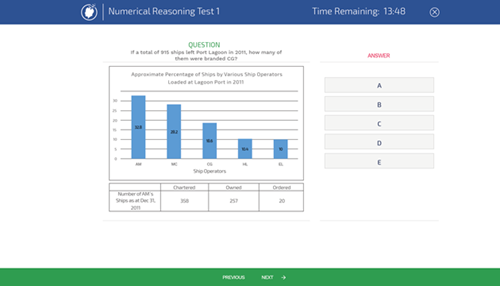
Most certainly in a Cognitive Ability Test, you will also come across Number Sequences which are commonly referred to as ‘number smart’ and ‘speed tests’ to test basic arithmetic skills.
If you want to find out where you stand on number sequences and have 5 minutes to spare, take the FREE Number Sequences Test with 10 questions and see how you rank against other candidates! Click on the provided link above or the image below.
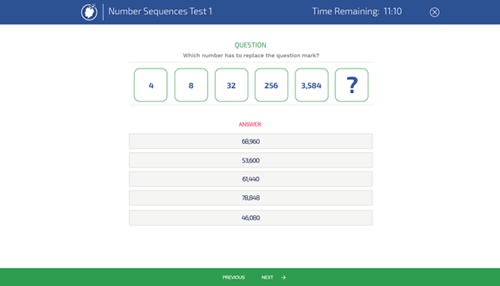
What else you can expect in Numerical Reasoning are Math Word Problems which test a tricky combination of numerical and verbal efficiency. The candidate is provided with a verbal statement that has a number of implicit arithmetic inter-relationships which are followed by a question. It is the candidate's task to provide the correct multiple-choice answer.
Learn more about Math Word Problems by taking the FREE Math Word Problems Test with 3 questions. Click on the provided link above or the image below.
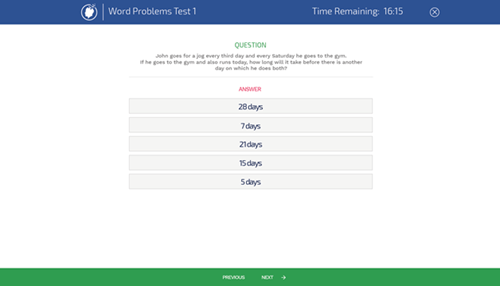
Verbal Reasoning
The Verbal Reasoning component of the Cognitive Ability Preparation Package includes the following tests:
- Verbal Reasoning: 13 tests with 156 questions.
We will now reveal the Verbal Reasoning part of the puzzle which you will definitely have to pass with flying colors if you are aiming to pass the cognitive ability test. This part of the test predominantly comes down to the assessment of the candidate's reading comprehension skills. Verbal Comprehension is usually tested against the clock and it is of the essence to read the question precisely and take in all the information efficiently so you can formulate an answer quickly.
Verbal reasoning tests are usually written as one paragraph, section, or passage followed by several questions and/or theses. These questions and/or theses need to be answered with “True”, “False”, or “Cannot say”,
Test your Verbal Reasoning proficiency by taking the FREE Verbal Reasoning Test with 10 questions. Click on the provided link above or the image below.
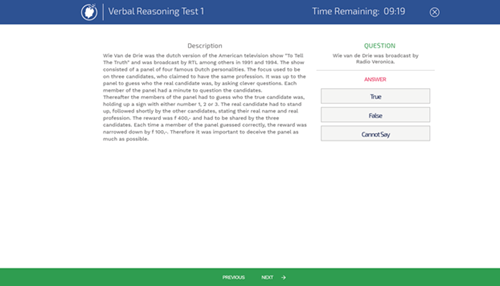
Abstract Reasoning
The Abstract Reasoning component of the Cognitive Ability Preparation Package includes the following tests:
- Abstract Reasoning: 9 tests 72 questions
Abstract Reasoning assesses a candidate’s general intellect and ability to engage in non-verbal reasoning. It is often the case that you are required to observe an image, and transpose what you see into a coherent pattern, conclusion, and answer. In this test, you need to show your capacity to infer logical assumptions that are based on presented visual information supplied in the form of symbols and/or matrices.
In an Abstract Reasoning test, you will commonly be required to identify a missing item, diagram of a figure that completes and concludes a certain and particular logical pattern. Such a test will give in-depth insights into a candidate’s ability to work out a variety of spatial relationships.
Complete the FREE Abstract Reasoning Test with 8 questions! Click on the provided link above or the image below.
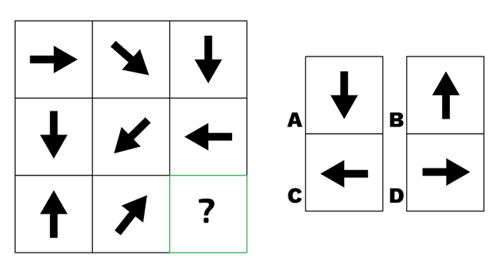
Logical Reasoning
The Logical Reasoning component of the Cognitive Ability Preparation Package includes the following tests:
- Logical Reasoning: 15 tests with 150 questions.
- Inductive Reasoning: 12 tests with 144 questions in total.
- Deductive Reasoning: 9 tests with 135 questions in total.
Logical Reasoning can be deconstructed into the opposing ‘bottom-up’ Inductive Reasoning and ‘top-down’ Deductive Reasoning systems.
With logical Reasoning, relationships between premises and ideas are expanded upon to come up with potentially correct patterns. The relationships between ideas are tested rigorously, in order to draw the right conclusion. Logical Reasoning assesses the candidate's capacity to use structured thought processes to figure out an accurate response to a posed question. Logical reasoning tests assess your ability at skills such as how to interpret patterns or relationships between shapes. Candidates have to go back and forth between Inductive Reasoning and Deductive Reasoning to make inferences, which are expanded upon if they show promise, and deductively cut off when they are proven to be illogical.
Complete the FREE Logical Reasoning Test with 10 questions! Click on the provided link above or the image below.
